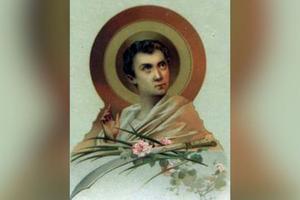Take a Lesson From Pope St. Sixtus II's Courage, and Take Hope
The story of Sixtus II and his holy companions should not only stir within us a zeal for our own faith, but should teach us the value of staying hope-filled amidst a fallen world.

It’s no secret that the early Church was a rough place. For about three centuries, Christians were more or less on the lam from the Roman Empire, doing everything they could to avoid capture and (often) certain death. There were brief periods of respite, where Roman officials were more lax, but the reign of Valerian wasn’t one of those times.
The man running the Church in those days was the great Pope St. Sixtus II, who’d been elected in secret as the 23rd Successor of St. Peter on August 30, 257. Sixtus, according to his biographer, was a “good and peaceful priest” who was rather skillful in avoiding the first of Valerian’s brutal persecutions, which occurred in his first months as pope.
Sixtus exercised the ministry of the Church unbothered for nearly a year, until the emperor ushered in a second and altogether more ghastly persecution. Valerian, who was initially tolerant of the young Church, grew paranoid in the summer of 258 that such tolerance angered the gods and was the reason his empire was beginning to crumble. As a result, it was ordered that clergy be put to death on the spot, and that laity be treated barely more leniently.
On Aug. 6, 258, Sixtus was presiding over a clandestine liturgy in the cemetery of Praetextatus when Roman officials burst in and captured the pontiff and four deacons. An epitaph placed on Sixtus’ tomb a century later by Pope St. Damasus I recounts the scene:
At the time when the sword pierced the bowels of the Mother, I, buried here, taught as Pastor the Word of God; when suddenly the soldiers rushed in and dragged me from the chair. The faithful offered their necks to the sword, but as soon as the Pastor saw the ones who wished to rob him of the palm (of martyrdom) he was the first to offer himself and his own head, not tolerating that the (pagan) frenzy should harm the others. Christ, who gives recompense, made manifest the Pastor's merit, preserving unharmed the flock.
The Holy Father, embodying our Lord’s command in John 15:13, willingly laid down his very life for his friends, the flock he was called to protect at all costs. Such a gesture is especially poignant for us as we navigate an increasingly hostile Western society.
The story of Sixtus II and his holy companions should not only stir within us a zeal for our own faith, but should teach us the value of staying hope-filled amidst a fallen world. Hope, we ought to remember, isn't simply bland optimism, but is rather, as Archbishop Charles Chaput put it, “having confidence that the future is in God’s hands.”
Who are we beholden to in this life, and just how serious are we about defending them with our own lives? More to it, when the going gets particularly tough, are we hopeful in our prayer that we’ll have the courage to persevere? Do we recognize that the Lord is the Divine Ruler of all things, and thus will help us through those moments when the situation is bleakest? Even especially when things look the worst?
Regardless of our answers in the present moment, we ought to remind ourselves always that hope, as a virtue, is something that must be cultivated. It isn't something we can put on and throw off willy-nilly. In fact, it’s precisely in the moments where our resolve is the most tested that our real opportunity to be hopeful happens.
G.K. Chesterton, as usual, wrote eloquently:
“Hope means hoping when things are hopeless, or it is no virtue at all... As long as matters are really hopeful, hope is mere flattery or platitude; it is only when everything is hopeless that hope begins to be a strength.”
True Christian hope is seen par excellence in Sixtus and his friends — Pope St. Sixtus II knew that he had run the race well, and that it was an eminently good thing to offer his life so that others might live.
Why? Because we have a God who did it first.
By daily preaching and living and witnessing to the Risen Christ, by pondering the mysteries of our faith, and through them reflecting on just how good our God is for granting us a Savior, let us pray that we, too, might be graced with the courage of Sixtus II and his companions. Our world needs it now, more than ever.
Pope St. Sixtus II and companions, pray for us!
- Keywords:
- pope st. sixtus ii
- martyrs
- hope

















